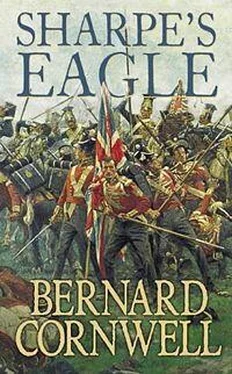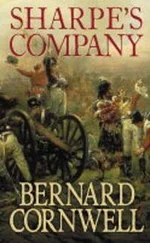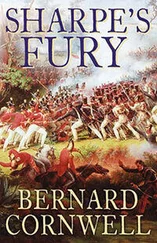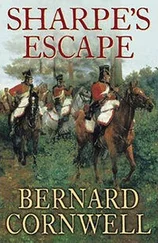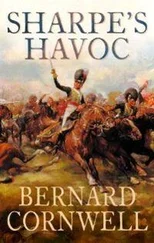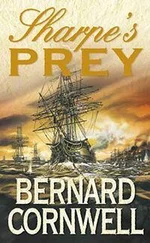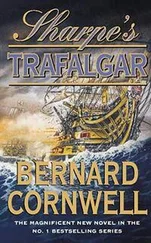“You are relieved, Sir Henry. The Battalion is mine.”
“What… „The man did-not wait to argue. He turned to a smiling Forrest and rapped out a stream of orders. The Battalion was halting, turning, heading back for the battle. Simmerson rode up behind the man and shouted a protest, but the Lieutenant Colonel wheeled on him with a drawn sword and bared teeth, and Sir Henry decided that this was no place for an argument and reined in his horse instead. The new man then looked at Gibbons.
“Who are you, Lieutenant?”
“Gibbons, sir.”
“Ah yes. I remember. Of the Light Company?”
“Yes, sir.” Gibbons flashed a frantic look at his uncle, but Simmerson was staring at the advancing French. The new Colonel hit Gibbons’ horse with the flat of his sword.
“Then join the Light Company, Mr. Gibbons! Hurry! They need help, even yours!”
The French advanced across a plain that was dotted with bodies, hung about by smoke, but tantalisingly empty of troops. Sir Henry sat his horse and watched the South Essex march towards the battle, saw another Battalion, the 48th, hurrying into the path of the enemy, and from the far side of the gaping hole other British Battalions marched desperately to make a thin screen in front of the massing Eagles. Staff officers kicked up dust as they galloped down the slope; the long six-pounders reared back on their trails as they pounded the enemy; British cavalry hovered menacingly to stop the enemy’s horsemen trying to exploit the shattered British Battalions. The battle was still not lost. Sir Henry looked round the hilltop and felt terribly alone.
Sharpe’s view of the battle was blocked by the Battalion of Dutch troops and by the smoke which drifted like strange fog patches in the burning Spanish heat. With the retreat of the first line of French columns the Dutchmen had become a target for the British guns and, sensibly enough, the white-coated troops had deployed from column into line. They now stood like a dirty white wall at right angles to the stream and faced the fleeing remnants of the King’s German Legion who ran across their front. Sharpe could see the Dutchmen ramming and firing their muskets at the broken Battalions, but they made no move to advance and finish off the survivors, and Sharpe guessed that, with their Colonel shot by Hagman, the Battalion was uncertain what to do and was waiting for the second French attack to catch up with them.
“Sir! Sir!” Ensign Denny tugged Sharpe’s jacket and pointed. Through the hanging smoke from the Medellin guns Sharpe saw a British Battalion marching down the hill. “It’s ours, sir! Ours!” Denny was excited, jumping up and down as the single standard cleaved the smoke and came into full sight on the hillside. They were still a quarter of a mile away, and behind them, dimly glimpsed through the smoke, Sharpe could see another Battalion marching for the gap to put itself in front of this second, larger French attack. He could hear the drums again, as persistent as ever, and he sensed that the crisis of the battle was coming and, as if in confirmation, the French guns started again and from their searing hot barrels threw shell after shell into the British Battalions that were racing to form a new line to meet the next attack. Victory was so close for the French, they had only to break through the scratch defence that was scrappily forming, and the day was theirs.
Sharpe’s men were forgotten. They were a small band in the bottom of a shallow valley on the edge of a great fight. Battalions had been broken on both sides, there were hundreds of dead, the brook was running with blood and now, in the smoke and noise, thousands of Frenchmen marched at the splintered British line. At any moment the attack would strike stunningly home and the British reserves would crumble or hold, and Sharpe stood, sword in hand, uncertain what to do. Harper tapped his arm and pointed to a horseman who was coming slowly towards them from the Medellin. “Lieutenant Gibbons, sir!”
Sharpe turned back to the fight. Presumably Gibbons was coming with orders from Simmerson, but Sharpe had no confidence in the Colonel and was not particularly interested in whatever message Gibbons was bringing. The South Essex was still some moments away from opening fire on the white-coated Battalion in front, and when they did Sharpe knew the Dutchmen would turn on their attackers and he had no trust in Simmerson’s ability to fight the Battalion. It was best to ignore the South Essex.
The Dutchmen were covered in smoke. As the fighting grew to a new intensity the powder smoke thickened into a dirty-white cloud that hid everything, and the far sounds of cavalry trumpets took on a sinister threat. Sharpe relaxed. There were no decisions to make, the battle was being decided by thousands of men beyond the Dutch musket smoke, and the South Essex Light Company had done its duty. He turned to Harper and smiled.
“Can you see what I see?”
Harper grinned, his white teeth brilliant against his powder-blackened face. “It’s very tempting, sir. I was thinking of it myself.”
Two hundred yards away, in the centre of the Dutch line, was an Eagle. It flashed gold in the light, its outstretched wings shadowing the pole on which it was mounted. Harper stared at the backs of the Dutch infantry, who fired at an unseen target in the smoke beyond. “It would make a great story, so it would.”
Sharpe plucked a blade of grass and chewed it, then spat it out. “I can’t order you to come.”
The Sergeant smiled again, a big, happy smile on a craggy face. “I’ve nothing better to do. It will take more than the two of us.”
Sharpe nodded and grinned. “Perhaps Lieutenant Gibbons might lend a hand?”
Harper turned and stared at Gibbons, who now hovered fifty yards behind the company. “What does he want?”
“God knows. Forget him.” Sharpe walked in front of his men and looked at them. They squatted on the grass, their faces filthy, their eyes red and sunken from the powder smoke and the strain of battle. They had done more than well. They looked at him expectantly.
“You’ve done well. You were good and I’m proud of you.” They grinned, embarrassed at the praise, pleased by it. “I’m not asking a thing more of you. The Battalion’s on its way here, and in a minute Mr Denny will take you back and form you up on the left as usual.” They were puzzled, their grins gone. “Sergeant Harper and I are not coming. We think it’s bad that our Battalion only has one colour, so we’re going to fetch another one. That one.” He pointed at the Eagle and saw the men look past him. One or two grinned; most looked appalled. “We’re going now. Anyone who wants to come is a fool but they’ll be welcome. The rest of you, all of you if you like, will go back with Mr Denny, and the Sergeant and I will join you when we can.”
Denny protested. “I want to come, sir!”
Sharpe shook his head. “Whoever else comes, Mr Denny, you are not. I’d like you to have a seventeenth birthday.”
The men grinned, Denny blushed, and Sharpe turned away from them. He heard Harper unsheath his bayonet and then came the sound of other blades clicking into place. He began to walk towards the enemy, sword held low, and heard the steps behind him. Harper was beside him, and they walked on towards the unsuspecting Battalion.
“They’ve all come, sir. All.”
Sharpe looked at him. “All?” He turned. “Mr Denny? Go back to the Battalion! That is an order!”
“But, sir… „
“No, Mr Denny. Back!”
He watched as the boy turned and took a few steps. Gibbons was still sitting on his horse and watching them, and Sharpe wondered again what the Lieutenant was doing, but it was immaterial; the Eagle was all. He turned back and went on, praying that the enemy would not notice them, praying to whatever was beyond the blue sky skeined in smoke that they would be successful. He had set his heart on an Eagle.
Читать дальше
